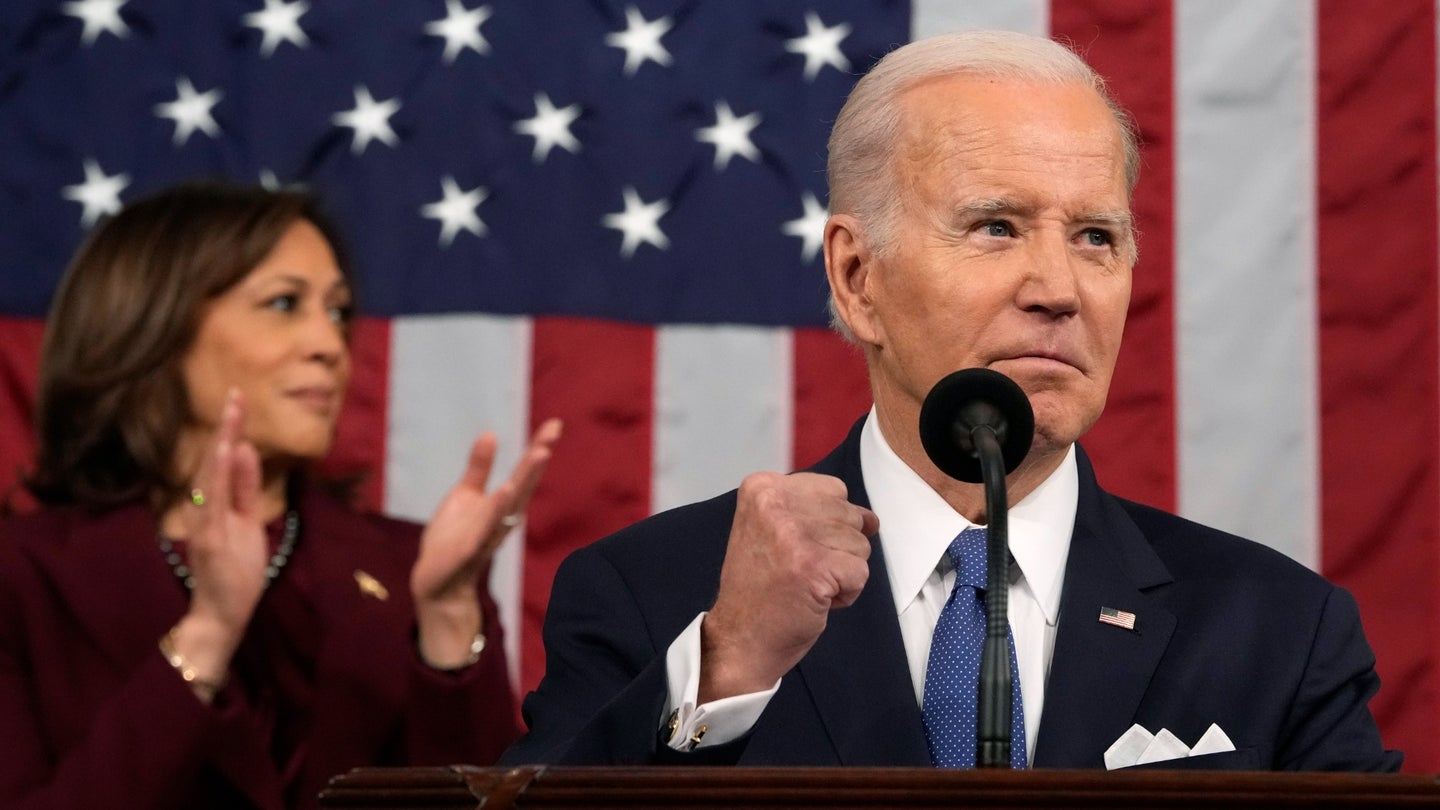In the latest State of the Union, Biden highlights infrastructure, chips, and healthcare
In his second SOTU address, Biden urged Congress to ‘finish the job.’

On February 7, President Joe Biden gave his 2023 State of the Union Address to a joint session of a newly split Congress, with Democrats controlling the Senate and Republicans controlling the House. This is what he had to say on major science, tech, and health related issues.
Health policy priorities—COVID and healthcare
Biden touted the progress made to combat COVID-19 since he first took office in January 2021, when the COVID-19 vaccine rollout was just getting underway since beginning in December 2020. “COVID no longer controls our lives,” he said, “while the virus is not gone, thanks to the resilience of the American people, and the ingenuity of medicine, we have broken COVID’s grip on us.”
The administration stands to end the public health emergency on May 11. The change to formally end the national emergency declarations would restructure the federal government’s response to treating the virus as an endemic threat to public health that can be managed through normal authorities.
[Related: Biden will end COVID-19 national emergencies in May. Here’s what that means.]
He also pointed to several policies Congress can still achieve to deliver cheaper prescription drugs to the American people—for example continuing to expand Medicaid under the Affordable Care Act, and capping the cost of insulin at $35 for seniors on Medicare.
“But there are millions of other Americans who are not on Medicare, including 200,000 young people with Type I diabetes who need insulin to save their lives,” said Biden. “Let’s finish the job this time. Let’s cap the cost of insulin at $35 a month for every American who needs it.”
This was the first State of the Union after the Supreme Court overturned Roe v. Wade, and President Biden vowed to veto any national abortion ban. The Biden administration has taken steps to expand abortion access in the wake of the decision, including steps to make it easier to access the prescription pills used in a medication abortion.
He touted the success of the PEPFAR program that has saved 25 million lives and transformed the global fight against HIV/AIDS and the Cancer Moonshot program that Biden led while Vice President to Barack Obama. The program is a very personal initiative to the Bidens after their son Beau died of a brain tumor in 2015.
“Our goal is to cut the cancer death rate by at least 50 percent over the next 25 years. Turn more cancers from death sentences into treatable diseases. And provide more support for patients and families,” said Biden.
When it comes to tech, CHIPS takes the spotlight
American ingenuity in tech was also on full display, with Biden highlighting the bipartisan Infrastructure Law and CHIPS and Science Act, especially when it comes to the jobs that will be created by investing in infrastructure and tech. The legislation devotes more than $50 billion intended to spur semiconductor manufacturing, research, development, and more in the United States.
[Related: Can the Chips and Science Act help the US avoid more shortages?]
“Semiconductors, the small computer chips the size of your fingertip that power everything from cellphones to automobiles, and so much more. These chips were invented right here in America. Let’s get that straight, they were invented in America,” said Biden. “America used to make nearly 40 percent of the world’s chips. But in the last few decades, we lost our edge and we’re down to producing only 10 percent.”
He also announced a new standard that will require all construction materials used in federal infrastructure projects to be made in America and stressed his administration’s commitment to providing Americans with universal access to high-speed internet.
Climate and the environment—wins and losses
The Biden Administration’s recent flurry of environmental legislation amidst the past year’s spike in gas prices shifted the spotlight on his policies on climate change.
“The Inflation Reduction Act is also the most significant investment ever to tackle the climate crisis. Lowering utility bills, creating American jobs, and leading the world to a clean energy future,” said Biden, before touting the investments aimed at modernizing infrastructure in the face of a changing planet from electric grids to floods and water systems and clear energy.
[Related: 4 ways the Inflation Reduction Act invests in healthier forests and greener cities.]
He also called the $200 billion in profits brought in by oil and gas companies during a global energy crisis “outrageous,” and proposed quadrupling the tax on corporate stock buybacks to encourage more investment in increasing domestic energy production and keeping costs down.
High profile attendees included wildfire experts and cancer survivors
U2 frontman Bono, Tyre Nicols’ family, and Paul Pelosi were among the high profile guests for the 535 members of Congress. Several were innovators, activists, and scientists making a mark on the science and tech world.
These included Jennifer Gray Thompson, the CEO of After the Fire USA, Paul Bruchez, a rancher who has worked with other landowners to restore a part of the threatened Colorado River, Grover Fugate, the Executive Director of the Rhode Island Coastal Resources Management Council (CRMC), and David Anderson, President and CEO of NY-CREATES and the Albany Nanotech Complex.
Some of the guests invited to the First Lady’s Box included Maurice and Kandice Barron whose daughter Ava is a survivor of a rare form of pediatric cancer, Amanda Zurawski, a woman from Texas who almost lost her life to a miscarriage due to Texas’ abortion law, and Lynette Bonar, an enrolled member of Navajo Nation who helped open the first cancer center opened on a Native American reservation.
